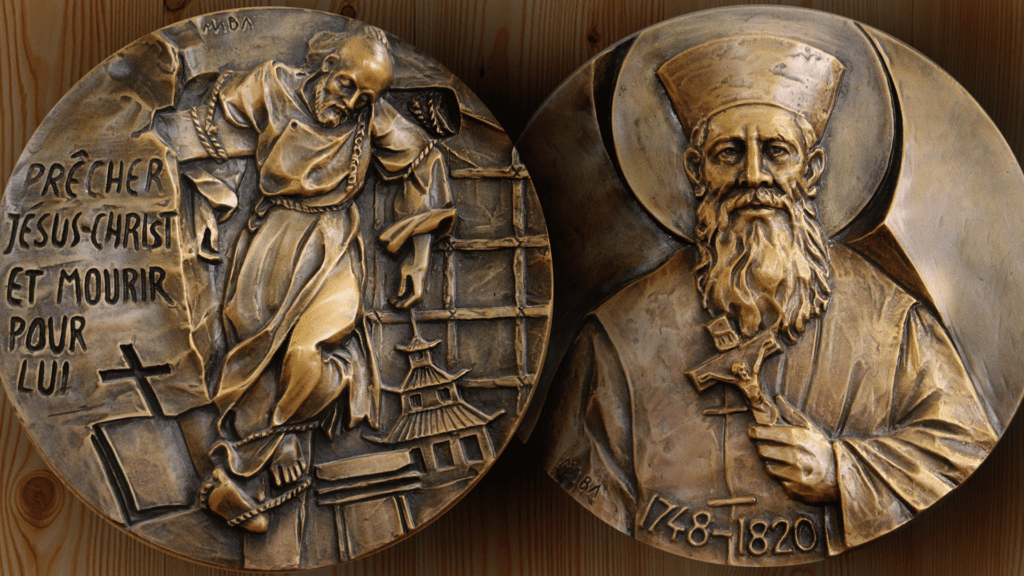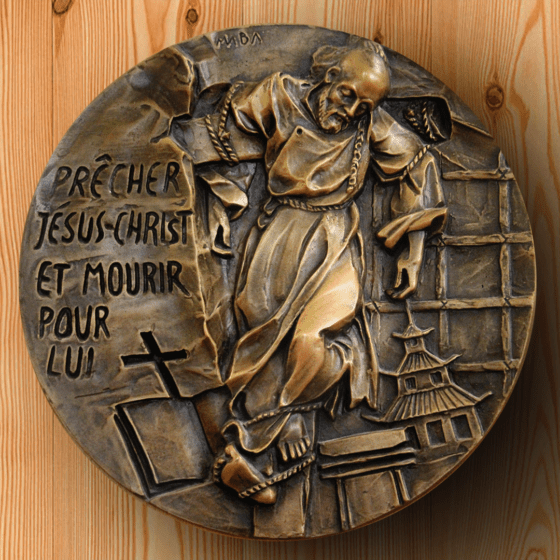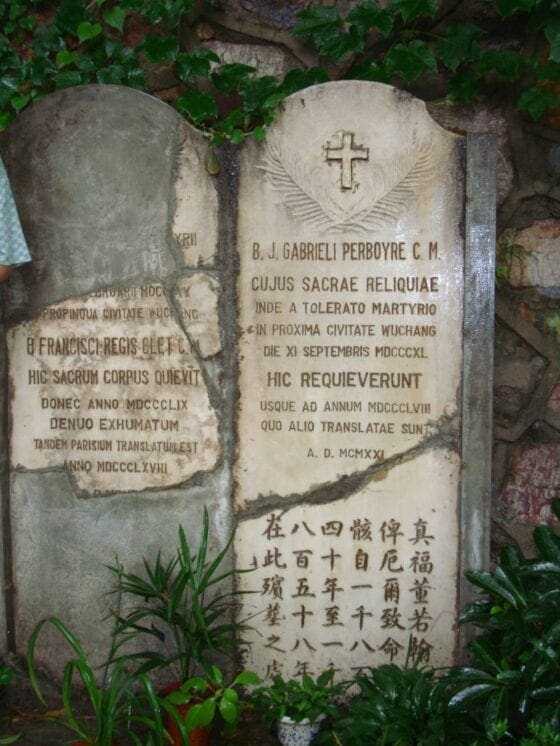Last week we published an article that caused a stir in the members of the branches of the Vincentian Family: it was proposed that our Saint Jean Gabriel Perboyre, a martyr in China, become an intercessor for the patients of the Coronavirus Pandemic, taking into account how he died and where he died. Today we want to offer you this reflection, regardless of whether he becomes an intercessor or not, about the example his life gives to every Vincentian missionary. The article is from the current Visitor of the Chinese Province.

Introduction
It was in 2000 when I first visited Wuhan, China, the place where St. John Gabriel Perboyre was martyred. With massive infrastructure development going on around the city, it was almost impossible to trace back and recognize the important places where Perboyre made his last days. It was a consolation for me though to see his tombstone alongside with Blessed Regis Clet clandestinely erected at the back of a major seminary building (which is now closed) as quiet attempt to retrieve their memories that have been forcefully erased from local Christians. The tombstones are the remaining reminders of what missionaries have to endure in foreign lands just to proclaim God’s love. This short article reflects the missionary spirit of St. John Gabriel Perboyre as valuable example for Vincentian missionaries in modern time.
Weak yet strong
Perboyre’s poor health condition did not dictate the state of his spirit – for what was lacking physically, the spirit filled. Despite his poor health, he volunteered to go to mission a few times and rejected on reason he knew well until the doctor in 1835 allowed him to do so. He knew that physical fitness was needed for the rigors of mission. To do sea travel from France to China indeed needed physical stamina as cramp ships were prone from various kinds of disease. Moreover, traveling from Macau to inner parts of China required physical endurance and strength for it took months to reach by foot and river boat the intended destination. The difficulties of travel indeed affected his health. In fact, he got sick when he arrived in Hunan, his first mission station. However, his spirit for mission overcame all the harsh conditions of sea voyage, tough land travel and rugged life in mission lands of China. He wrote, “After great effort and trouble, I arrived on foot at the last mountain. But here I could do no more. Seeing it standing up in front of me, I happened to remember that I was wearing a small crucifix to which was attached the indulgence of the Way of the Cross. This was surely an opportunity to try and gain it.” Perboyre survived all these obstacles for he had inner strengths to compensate from what his physical strength lacked – spiritual and emotional strengths.
A missionary today needs more emotional and spiritual strengths than physical in order to endure the stress of being a foreigner, high demands from ministries and pressure from expectations. When one lacks these strengths, it would be difficult to find meaning from the struggles he faces in mission. Hardships in mission today is not brought more by harsh living conditions than by emotional stresses of loneliness and by spiritual fatigue of individualism. As Vincentian missionaries, we are called to be strong as what St. Vincent de Paul said praising the missionaries in Madagascar on July 24, 1655, “Yes, the Congregation of the Mission can do all things because we have within us germ of the omnipotence of Jesus Christ, and therefore no one is excusable on the ground of powerlessness; we shall always have more strength than we need, especially when an opportunity arises because, when a man finds he has an opportunity he becomes a new man.”
Far yet at home
 It took Perboyre almost five months to reach the port of Macau with eight thousand miles distance from France. However, the challenge did not lie on physical distance but on the immensity of differences of culture, language and way of living. Imagine how a French missionary like Perboyre who was used with French cuisine and familiar with rubrics of French meal had to eat rice using chopsticks for the first time. Much more to imagine the immeasurable differences of language. Though Perboyre found his new mission place totally far from where he came from, yet he was at home because his heart was well-disposed for such enormous differences. He carried with him the spirit for adaptation – an invaluable attitude of a good missionary. He wrote to his brother “If you could see me now I should be an interesting sight for you with my Chinese apparel, my head shaved, my long pigtail and mustache, lisping my new language, eating with chopsticks instead of the knife, fork and spoon. They say I look very like Chinese. That is where we must begin: making ourselves all things to all men. May we be able in this way to gain them all to Christ.”
It took Perboyre almost five months to reach the port of Macau with eight thousand miles distance from France. However, the challenge did not lie on physical distance but on the immensity of differences of culture, language and way of living. Imagine how a French missionary like Perboyre who was used with French cuisine and familiar with rubrics of French meal had to eat rice using chopsticks for the first time. Much more to imagine the immeasurable differences of language. Though Perboyre found his new mission place totally far from where he came from, yet he was at home because his heart was well-disposed for such enormous differences. He carried with him the spirit for adaptation – an invaluable attitude of a good missionary. He wrote to his brother “If you could see me now I should be an interesting sight for you with my Chinese apparel, my head shaved, my long pigtail and mustache, lisping my new language, eating with chopsticks instead of the knife, fork and spoon. They say I look very like Chinese. That is where we must begin: making ourselves all things to all men. May we be able in this way to gain them all to Christ.”
Nowadays, even though the remotest mission areas are not spared from influences of globalization and internationalizations – where fusion restaurants exist, mishmash mentalities are well accepted, jumbled languages are said – yet there still lies a deep desire from locals for foreigners to understand and adapt to what the locals offer. The challenge for missionaries of today is about how to be at home on whatever the new environment offers, only then that one can start to see clearly on things that are suited for inculturation. Adaptation is a necessary attitude for inculturation, and Perboyre gave us an example.
Afraid yet determined
He heard well and knew clearly that the mission territories he volunteered to go were hostile. It was a dangerous time for foreigners to be in in the midst of Chinese who were suspicious of foreign interventions and foreign influences. The cross and the faith that was attached with it were thought as foreign, and therefore evil. He knew clearly the possible consequences of his mission works and presence if caught. Perboyre for sure feared of what he heard about the persecutions and what happened to earlier missionaries, yet he chose to go and stay – not because he was reckless but because he was determined.
Foreign mission is always hostile at the beginning, not because of the external environment of mission place but because of fears, questions and prejudices that are battling inside us. Fears may halt our resolve, doubts may cripple our hearts, anxiety may put pressure on our will – all of these are but to test our determination. It depends solely on us if we let ourselves succumb from these fears and doubts. Perboyre’s written words to his father is a good reminder for all of us “If we had to suffer martyrdom, this would be a great grace from the good God; it is a thing to be desired and not to be feared.”
Restrained yet free
In many instances Perboyre found himself being restrained to do mission works. He was restrained at first by his superiors to go to China for reason of poor health. Later, he was greatly restrained to fully do mission works because of security. Moreover, language and cultural barriers hindered in some ways his works. But a true spirit for mission made him free because nothing can constrain this spirit.
We may find many reasons to be restrained from doing foreign mission works. Reasons that may spring from within our community, or may come from mission environment. Provinces always have a reason not to send missionaries abroad because local needs are high. Provincial administrators may weigh considerably the lack of personnel. Others may argue that works in foreign mission are not many compared locally. More others may say that learning another language is hard. When the spirit for foreign mission is lacking in a province or in a confrere, then there will  always be a reason to be constrained. The greatest factor that constrains us, is ourselves.
always be a reason to be constrained. The greatest factor that constrains us, is ourselves.
Furthermore, a missionary may feel overwhelmed by the constraints that new environment offers on doing mission
works – lacking of skills and resources, strict laws and policies, unacceptable local social structures and culture – are just of few elements that may constrain a missionary. However, when true spirit for mission is present, feeling of freedom exists. Language should not restrain us from communicating when we use the language love. Lack of skills and resources are not enough reasons because true spirit for mission is creative. Legal, political or religious barriers are not obstacles when God is on our side. Indeed, true missionary is free despite of many barriers.
Standing at the tombstones of St. John Gabriel Perboyre and Blessed Francis Regis Clet twenty years ago, I prayed silently for their intercessions to deepen my missionary spirit. Shortly after then, my missionary journey began.
Fr. Ferdinand Labitag, CM
Visitor, Chinese Province
Originally came from
the Province of Philippines,
Fr. Labitag does mission works
with Chinese Province since 2002.


I like very much the way St. John Gabriel Perboyre’s experience and context was translated into a challenge for us today. Thank you!